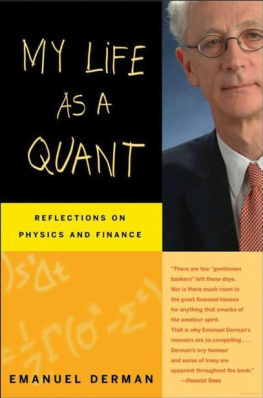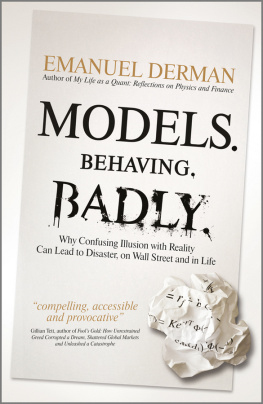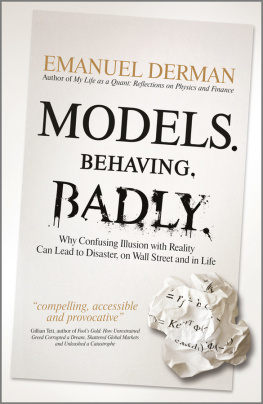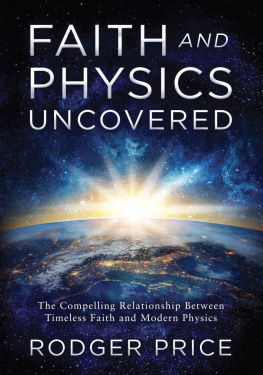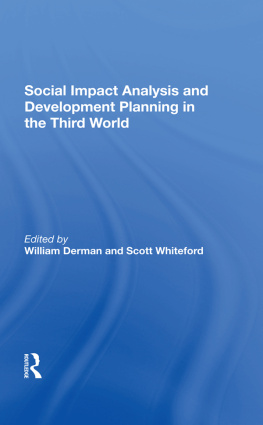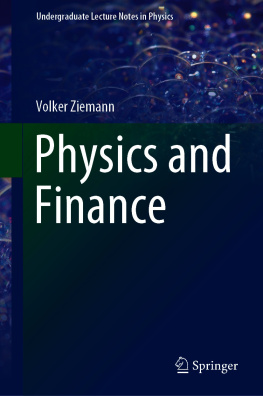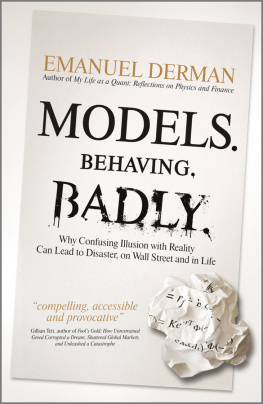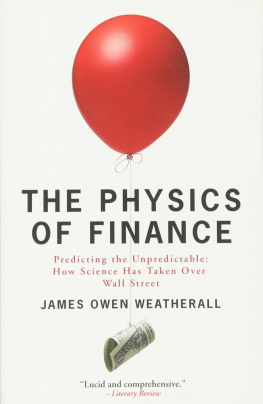"An honest account of the experience of going from an environment of Nobel Prize winners and pure thought to one of money, money, money. Derman gives us unique insight into the motivations of academia, the pressure to cast off worldly success in favor of matters more cerebral, then the mixed feelings during his descent into a world where the bottom line is P&L, and finally his success at bringing his own style of science into investment banking."
-Paul Wilmottt,
mathematician, author, and fund manager
"A fascinating personal account of one man's journey through several of the leading institutions of our time. Written by perhaps the leading practitioner of his generation, this insightful narrative explores the disparate cultures of physics, finance, and their powerful fusion known as phynance. This book is a mustread for aspiring quants, financial historians, and armchair sociologists interested in the machinations of both academia and industry."
-Peter Carr,
Head of Quantitative Research, Bloomberg, and Director, Masters in Math Finance, NYU
Emanuel Derman



To the Memory of My Parents
Ambition is a state of permanent dissatisfaction with the present.
TWO CULTURES 1
Physics and finance What quants do The Black-Scholes model Quants and traders Pure thought and beautiful mathematics can divine the laws of physics Can they do the same for finance?
CHAPTER 1 17
The attractions of science The glory days of particle physics Driven by ambitious dreams to Columbia Legendary physicists and budding uwnderkinder Talent versus character, plans versus luck
CHAPTER 2 29
Life as a graduate student Wonderful lectures T. D. Lee, the brightest star in the firmament Seven lean years Getting out of graduate school only half-alive
CHAPTER 3 53
The priesthood of itinerant postdocs Research isn't easy Almost perishing, then publishing The delirious thrill of collaboration and discovery
CHAPTER 4 65
Oxford's civilized charms One physics paper leads to another English idiosyncrasies The anthroposophists
CHAPTER 5 77
Research and parenthood on NewYork's Upper East Side A good life, but ... the tensions of twin careers
CHAPTER 6 85
A two-city family New age meditations Karma Goodbye to physics
CHAPTER 7 95
The world of industry-working for money rather than love The Business Analysis Systems Center at Bell Labs A small part of a giant hierarchy Creating software is beautiful
CHAPTER 8 117
Will Street beckons Interviewing at investment banks Leaving the Labs
CHAPTER 9 129
The Financial Strategies Group at Goldman, Sachs & Co. Learning options theory Becoming a quant Interacting with traders A new cast of characters
CHAPTER 10 143
The history of options theory Meeting and working with Fischer Black The Black-Derman-Toy model
CHAPTER 11 175
Manners and mores on Will Street The further adventures of some acquaintances Volatility is infectious
CHAPTER 12 191
A troubled year at Salomon Bros. Modeling mortgages Salomon's skill at quantitative marketing Mercifully laid off
CHAPTER 13 203
Goldman as home Heading the Quantitative Strategies Group Equity derivatives The Nikkei puts and exotic options Nothing beats working closely with traders Financial engineering becomes a real field
CHAPTER 14 225
The puzzle of the volatility smile Beyond Black-Scholes: the race to develop local-volatility models of options The right model is hard to find
CHAPTER 15 251
Will Street consolidates Clothing goes casual Moving from equity derivatives to firmwide risk The bursting of the Internet bubble Taking my leave
CHAPTER 16 265
Full circle, back to Columbia Physics and finance redux Different endeavors require different degrees of precision Financial models as gedanken experiments
MODELING THE WORLD
If mathematics is the Queen of Sciences, as the great mathematician Karl Friedrich Gauss christened it in the nineteenth century, then physics is king. From the mid-seventeenth century to the end of the nineteenth, Newton's Law of Gravitation, his three Laws of Motion, and his differential calculus described with apparent perfection the mechanical motion of objects in our world and the solar system.
In 1864, two hundred years after Newton, the Scottish physicist James Clerk Maxwell formulated the compact and elegant differential equations that described with similarly astounding precision the propagation of light, X-rays, and radio waves. Maxwell's equations showed that electricity and magnetism, formerly separate phenomena, were part of the same unified electromagnetic field.
We cannot simply look at the world around us and deduce Newton's Laws or Maxwell's equations. Data on its own does not speak. These equations were triumphs of the mind, abstracted from the world in some miraculous confluence of hard thinking and deep intuition. Their success confirmed that pure thought and beautiful mathematics have the power to discover the most profound laws of the universe.
At the start of the twentieth century, the pace accelerated. Einstein, pondering the conflicts between the Newtonian and Maxwellian views of the world, proposed his Theory of Special Relativity that amended Newton's mechanics and made them consistent with Maxwell's equations. Fifteen years later Einstein trumped Newton again with his proposal of the General Theory; it corrected the Law of Gravitation and described gravity as a large-scale wave in space and time. At almost the same time, Bohr, Schrodinger, and Heisenberg, with help from the everprodigious Einstein, developed the quantum mechanical theory of the small-scale behavior of molecules, atoms, and subatomic particles.
It was Einstein who perfected this mental approach to discovering the laws of the universe. His method wasn't based on observation or empiricism; he tried to perceive and then enunciate the very principles that constrained the way things should work. In a 1918 speech on the principles of research given in honor of Max Planck, the discoverer of the quantum, Einstein captured the magus-like appeal of trying to see through a glass, darkly, when he said: "There is no logical path to these laws; only intuition, resting on a sympathetic understanding of experience, can reach them."

